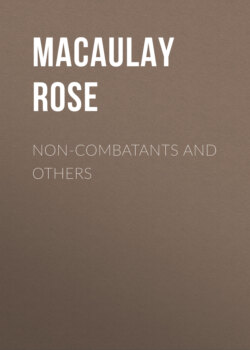Читать книгу Non-combatants and Others - Macaulay Rose - Страница 15
На сайте Литреса книга снята с продажи.
3
ОглавлениеIn a pause John said to Alix across the table, 'What's Aunt Daphne doing now?'
There was a slight sense of jar. Margot, who was sympathetic, was ashamed for Alix, because of what her mother, Daphne Sandomir, was doing. For this always unusual lady, instead of being engaged in working for the Red Cross, Belgian refugees, or soldiers' and sailors' families, was attending a peace conference in New York. She had gone there from France, which she had been helping the Friends to reconstruct. She was not a Friend herself, not holding with institutional religion, but she admired their ready obedience to the constructive impulse. She was called by some a Pacificist, by more a Pacifist, by others a Pro-German, by most a member of the Union of Democratic Control, which she was not, for reasons which she was ready to explain, but which need not be here detailed.
Alix told John, in her clear, indifferent, rather melancholy little voice, about the peace conference. In common with many children of two intensely enthusiastic parents (her father had been a Polish liberationist, who had died in a Russian prison) she had a certain half-cynical detachment from and indifference to ardours and causes. Her mother was always up to some stirring enterprise, always pursuing some vividly seen star. She had been at Newnham in the days when girls went to college ardently, full of aims and ideals and self-realisations and great purposes (instead of as now, because it seems the natural thing to do after school for those with any leanings towards learning) and she had lived her life at the same high pitch ever since. Alix found her admirable, but discomposing. She found Alix engaging, even intriguing, but narrow-hearted, selfish and indolent; she accused her of shrinking from the world's griefs in a way unworthy of her revolutionary father, whom she closely resembled in face and brain.
John was rather interested in the peace conference. He had read something about it the other day in one of the periodicals which flourished in the University to which he belonged, and which wholly approved of the enterprise. Not that John, for his part, wholly approved of the periodical; he found it a trifle unbalanced, heady, partisan. John was a very fair-minded and level-headed young man, of conservative traditions. But independent, too. When the temporary second lieutenant with both legs blown off, who had occupied the next bed to his in the Royal Free, had said, perusing the comments on the peace conference in the periodical in question (under the heading 'A Triumph of Pacifism'), 'What sickening piffle, isn't it?' John had said, after a little cogitation, 'Well, I don't know. They mean well.' The legless lieutenant (Trinity Hall) had snorted, 'They mean well to the Boche. … After all our trouble … all the legs we've lost … to cave in now. … Besides, what do they think they can do? A lot of people gassing. … I wonder who they are?'
John had said he believed one of his aunts was keen on it.
'Sort of thing aunts would be keen on,' the other youth had vaguely, and, indeed, quite inaccurately commented.
On the whole John didn't much hold by such movements, but he took a more lenient view of them than the rest of his family did.
His father said, 'A little premature, discussing peace terms before we know we're going to be in a position to dictate them.'
His mother murmured, 'Peace, peace, where there is no peace,' and smiled kindly at Alix to comfort her for her mother.
Dorothy said, answering her father, 'Well, of course we know we are. But I don't see any use in discussing things beforehand, anyhow: we shall be able to think when the time comes.'
Mademoiselle looked with her round black eyes from one to another, like a robin. She might have been reflecting in her mind that Dorothy was very English, Mr. Orme very depressing, Mrs. Orme very kind, John very impartial, and Alix very indifferent. What she said, turning to John, was (and she would seem to have been preparing the remark for some time: she was very keen on improving her English), 'The war is trulee devileesh, yes? The Boches are not as humans, no? More, is it not, Monsieur, as the devils from below?'
John grinned. Dorothy said, 'True for you, Mademoiselle.' Margot said, 'You're really coming on. Only you must say "like," not "as." "As" only comes in books; it's too elegant. And devilish isn't elegant enough.'
'El-ee-gant,' Mademoiselle repeated the word softly. She was perhaps wondering whether it was necessary to be elegant at all in one's references to the Boches.
